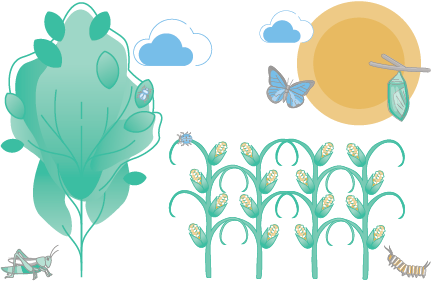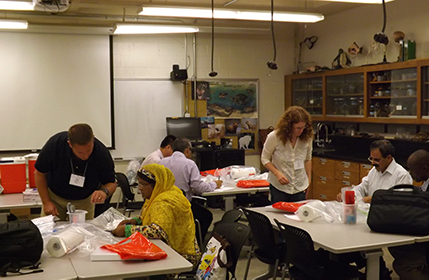Environmental Risk Assessment Workshop: Non-Target Organism Testing
-
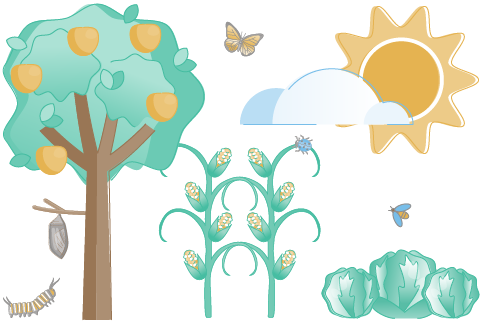
June 24, 2024-June 28, 2024
8:00 am - 5:30 pmGateway Hotel & Conference Center at Iowa State University
Ames, Iowa, USA
Supported by a grant from the United States Department of Agriculture (USDA) Foreign Agricultural Service (FAS) Emerging Markets Program (EMP), this five-day technical training workshop on non-target organism testing of transgenic crops was organized by the Agriculture & Food Systems Institute, in cooperation with the USDA Agricultural Research Service, Iowa State University, and Corteva Agriscience. The purpose of this activity was to provide regulatory scientists and environmental risk assessors with an experiential learning opportunity in laboratory and field testing of non-target organisms.
Using laboratory facilities provided by Iowa State University, the workshop participants gained experience setting up bioassays to assess the impacts of insect-resistant corn on corn earworm, the target pest, and on ladybird beetles, a beneficial non-target species. Participants also evaluated the bioassays, collected and compiled their data, and received feedback on their conclusions.
As part of this training,
- Participants learned how insect populations are assessed in agroecosystems using two common insect collection techniques: sticky cards to collect flying insects and pitfall traps to collect ground-dwelling insects.
- Participants gained first-hand experience setting up traps in established fields of insect-resistant and conventional corn.
- Participants were given the opportunity to review and critique data generated by commercial laboratories, which are typically provided to government regulators in support of applications to authorize commercial planting of insect-resistant crops.
Agenda
Day 1
Monday | June 24, 2024 | 08:00 – 17:30
| Time | Activity/Presentation | Lead | |
| 08:00 |
Shuttles Depart from the Gateway Hotel to the Iowa State University (ISU) Student Innovation Center (SICTR) | ||
| Session I: Welcome and Introductions |
|||
| 08:30 | Welcome to Iowa State University and Overview of the Facilities | Dr. Tom Sappington Research Entomologist, Corn Insects and Crop Genetics Research Unit, USDA – Agricultural Research Service, Ames, Iowa, USA |
|
| Dr. Richard Hellmich (retired) Lead Scientist and Research Entomologist (former), Corn Insects and Crop Genetics Research Unit, USDA – Agricultural Research Service, Ames, Iowa, USA |
|||
| 08:45 | Introduction of Participants & Resource People and Overview of the Workshop | Dr. Andrew Roberts Chief Executive Officer, Agriculture & Food Systems Institute, Washington, DC, USA |
|
| Session II: Environmental Risk Assessment (ERA) for Genetically Engineered (GE) Plants | |||
| 09:15 | History and Context for Agricultural Biotechnology and Risk Assessment | Dr. Andrew Roberts | |
| 09:45 | Problem Formulation: How Do You Begin an Environmental Risk Assessment? | Dr. Karen Hokanson Senior Manager, Scientific Programs, Agriculture & Food Systems Institute, Washington, DC, USA |
|
| 10:10 | Break | ||
| 10:25 | Understanding Protection Goals | Dr. Andrew Roberts | |
| 10:50 | The Modern ERA Paradigm for GE Plants | ||
| Session III: Laboratory Bioassay Setup | |||
| 11:15 | Welcome Remarks | Dr. Steve Harris Chair, Department of Plant Pathology, Entomology & Microbiology, Iowa State University, Ames, Iowa, USA |
|
| 11:30 | Introduction to Test Organisms and Bioassay Protocols | Dr. Chad Boeckman Global Regulatory Lead (Oilseeds), Corteva Agriscience, Johnston, Iowa, USA |
|
| 12:00 | Lunch | ||
| 13:15 | Set Up Bioassays | Groups | |
| 15:00 | Lab Bioassay Review | Ms. Kristine LeRoy Lead, Ecotoxicology and Safety Assessment Laboratory, Corteva Agriscience, Johnston, Iowa, USA |
|
| 15:30 | Break | ||
| Session IV: Tiered Testing for ERA | |||
| 15:45 | Introduction to Tiered Testing: Early Tier, Semi-Field, and Field Testing |
Dr. Jörg Romeis Head, Biosafety Research Group, Agroscope, Zurich, Switzerland |
|
| and Dr. Richard Hellmich | |||
| 16:30 | Introduction to Non-Target Field Studies |
Dr. Richard Hellmich | |
| 17:15 | Recap of the Day & Overview of Tomorrow’s Agenda | Dr. Andrew Roberts | |
| 17:30 | End of Day 1 – Shuttles Depart to the Gateway Hotel | ||
Day 2
Tuesday | June 25, 2024 | 08:00 – 20:00
| Time | Activity/Presentation | Lead | |
| 08:00 | Shuttles Depart from the Gateway Hotel to ISU Field Extension and Education Laboratory (FEEL) Center | ||
| Session V: Field Survey Setup | |||
| 08:15 | Questions from Day 1 & Review of Agenda for Day 2 | Dr. Andrew Roberts | |
| 08:30 | Introduction to Field Techniques | Dr. Richard Hellmich, Mr. Alexander Mullins, and Dr. Royce J. Bitzer | |
| 09:15 | Set Up Sticky Traps and Pitfall Traps | Groups | |
| 11:30 | Lunch | ||
| 13:00 | Tour of FEEL Center | ISU Extension Staff | |
| 14:00 | Shuttles Depart from FEEL Center to SICTR |
||
| Session VI: Planning and Designing NTO Studies |
|||
| 14:30 | Selection of Surrogate Species and Life Stages | Dr. Jörg Romeis | |
| 16:15 | Recap of the Day, Q&A, and Overview of Tomorrow’s Agenda | Dr. Andrew Roberts | |
| 17:30 | End of Day 2 – Shuttles Depart from SICTR to the Gateway Hotel | ||
| 17:45 | Shuttles Depart from the Gateway Hotel to Reiman Gardens |
||
| 18:00 | Reception at Reiman Gardens | ||
| 20:00 | Shuttles Depart from Reiman Gardens to the Gateway Hotel | ||
Day 3
Wednesday | June 24, 2024 | 08:00 – 17:00
| Time | Activity/Presentation | Lead | |
| 08:00 | Shuttles Depart from the Gateway Hotel to SICTR |
||
| 08:30 | Questions from Day 1 & 2 and Review of Agenda for Day 3 | Dr. Andrew Roberts | |
| Session VII: Interpreting Study Reports |
|||
| 08:30 | Introduction to Test Report Evaluation | Dr. Chad Boeckman | |
| 09:00 | Group Work on NTO Test Report Evaluation | Groups | |
| 12:00 | Working Lunch | ||
| 13:00 | Report Out from Each Group and Group Q&A | Groups | |
| 14:00 | Break | ||
| Session VIII: The Limits of NTO Testing | |||
| 14:30 | Introduction to Field Organisms and Identification | Dr. Richard Hellmich | |
| 15:15 | Recap of the Day, Q&A, and Overview of Tomorrow’s Agenda | Dr. Karen Hokanson | |
| 15:30 | End of Day 3 – Explore ISU Campus and Visit ISU Bookstore/Memorial Union |
||
| 17:00 | Shuttles Depart from ISU Campus to the Gateway Hotel | ||
Day 4
Thursday | June 24, 2024 | 08:00 – 21:00
| Time | Activity/Presentation | Lead | |
| 08:00 | Shuttles Depart from the Gateway Hotel to FEEL Center | ||
| Session X: Collection and Processing of Field Data |
|||
| 08:15 | Collect Sticky Traps and Pitfall Traps | Groups | |
| 09:30 | Shuttles Depart from FEEL Center to Science Hall II Laboratory |
||
| 09:45 | Break | ||
| 10:00 | Process Samples, Identify Samples, Post Results, and Compare | Groups | |
| 12:00 | Lunch | ||
| 13:00 | Shuttles Depart from Science Hall II to Corteva Agriscience | ||
| Session XI: Lab and Field Tour of Corteva Agriscience | |||
| 13:45 | Laboratory and Field Tour of Corteva Agriscience | Groups | |
| 15:45 | Recap of the Day, Q&A, and Overview of Tomorrow’s Agenda | Dr. Andrew Roberts | |
| 16:00 | End of Day 4 – Shuttles Depart from Corteva Agriscience to Jordan Creek Shopping Mall |
||
| 21:00 | Shuttles Depart from Jordan Creek Shopping Mall to the Gateway Hotel | ||
Day 5
Friday | June 28, 2024 | 08:00 – 16:30
| Time | Activity/Presentation | Lead | |
| 08:00 | Shuttles Depart from the Gateway Hotel to Science Hall II | ||
| 08:15 | Questions from Days 3 & 4 and Review of Agenda for Day 5 | Dr. Andrew Roberts | |
| Session XII: Collection and Analysis of Laboratory Bioassay Data |
|||
| 08:30 | Data Collection from the Lab Bioassays | Ms. Kristine LeRoy | |
| 09:00 | Lab Study Evaluation (Scoring the Test Set Up on Day 1) | Groups | |
| 10:30 | Break | ||
| 11:00 | Group Discussion: (1) Comparison of Bioassay Results and (2) Data Interpretation | Dr. Chad Boeckman or Dr. Richard Hellmich | |
| 12:00 | Lunch | ||
| Session XIII: Wrap Up and Participant Feedback | |||
| 13:00 | Insect Resistance Management and Other Tabled Issues | Dr. Richard Hellmich | |
| 14:00 | Data Transportability | Dr. Andrew Roberts and Dr. Jörg Romeis | |
| 14:30 | Participant Presentations (5-10 min): (1) Key learnings from the week and (2) How these will be applied (and shared) | Dr. Andrew Roberts | |
| 15:40 | Break | ||
| 15:50 | Participant Feedback & Post-Event Survey | Dr. Karen Hokanson | |
| 16:00 | Recap of the Week & Acknowledgments | Dr. Andrew Roberts | |
| 16:30 | Close of Workshop – Shuttles Depart from SICTR to the Gateway Hotel | ||
Speakers and Organizers
Dr. Bhavneet Bajaj
Agriculture & Food Systems Institute, USA
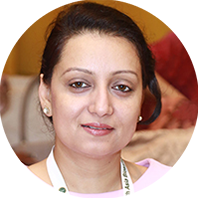 Dr. Bhavneet Bajaj joined the Agriculture & Food Systems Institute (AFSI) in July 2018 as Scientific Program Manager. She has been involved in projects related to safety assessment of foods and feeds derived from genetically engineered plants and serves as a resource person in providing technical support for capacity building programs in biotechnology. She was also the program lead for USDA-funded technical training for Chinese and Indonesian regulators and manages operations for both the Crop Composition Database and the World Nutrient Databases for Dietary Studies.
Dr. Bhavneet Bajaj joined the Agriculture & Food Systems Institute (AFSI) in July 2018 as Scientific Program Manager. She has been involved in projects related to safety assessment of foods and feeds derived from genetically engineered plants and serves as a resource person in providing technical support for capacity building programs in biotechnology. She was also the program lead for USDA-funded technical training for Chinese and Indonesian regulators and manages operations for both the Crop Composition Database and the World Nutrient Databases for Dietary Studies.
Prior to joining AFSI, Dr. Bajaj was a Visiting Scientist at the Sustainable Agricultural Systems Laboratory, Agricultural Research Service, USDA, where she worked on carotenoid pathway regulation in tomatoes. Before then, she was Associate Investigator with the Plant Protection group at (then) DuPont, where she devised a metabolic engineering strategy for insect control in soybean. While in India, she was an Assistant Professor at Jaipur National University, where she taught genetic engineering, enzymology, and biochemistry courses to M.Sc. level students. Her research work over the past 12 years involved plant secondary metabolites of nutritional, agricultural, and medicinal importance.
Mr. Keith Bidne
Corn Insects and Crop Genetics Research Unit, USDA-ARS
 Keith Bidne is an Agricultural Research Technician with the Corn Insects and Crop Genetics Research Unit, USDA-ARS in Ames, Iowa. He received his B.S. in Biology (1983) and M.S. in Plant Pathology (2004), both from Iowa State University. He has worked on a wide variety of research efforts, starting with disease resistance development in soybeans, forage quality testing, and several areas of entomology research. He has worked with both Dr. Richard Hellmich and Dr. Tom Sappington and has focused on European corn borer ecology and genetics, insect resistance management, non-target testing of genetically modified maize, and habitat restoration for monarch butterflies. Most recently, he has been the unit insect rearing specialist, maintaining laboratory colonies of European corn borer and monarch butterflies. He has been involved with research and outreach efforts for both species.
Keith Bidne is an Agricultural Research Technician with the Corn Insects and Crop Genetics Research Unit, USDA-ARS in Ames, Iowa. He received his B.S. in Biology (1983) and M.S. in Plant Pathology (2004), both from Iowa State University. He has worked on a wide variety of research efforts, starting with disease resistance development in soybeans, forage quality testing, and several areas of entomology research. He has worked with both Dr. Richard Hellmich and Dr. Tom Sappington and has focused on European corn borer ecology and genetics, insect resistance management, non-target testing of genetically modified maize, and habitat restoration for monarch butterflies. Most recently, he has been the unit insect rearing specialist, maintaining laboratory colonies of European corn borer and monarch butterflies. He has been involved with research and outreach efforts for both species.
Dr. Royce J. Bitzer
Corn Insects and Crop Genetics Research Unit, USDA-ARS and Department of Entomology, Iowa State University
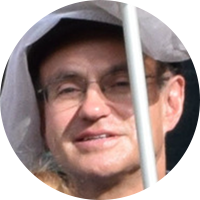
Dr. Bitzer was a research associate with the Iowa State University Department of Entomology from 1997-2004 and 2006-2010. He joined the USDA-ARS Corn Insects and Crop Genetics Research Unit in 2011 and stayed until 2020. He has studied the effects of transgenic corn and soybeans on non-target ground-inhabiting insects, especially Collembola and carabid beetles. From June 2021 to December 2023, he worked with Bayer CropScience on research about the effects of a specific variety of transgenic coleopteran Bt corn on non-target carabid and staphylinid beetles. He is now researching Red Admiral butterfly natal origin and migration through stable isotope analysis in cooperation with the Stable Isotope Paleo Environments Research Group, Department of Geological and Atmospheric Sciences, Iowa State University.
He received his B.S. (1980) in biology and his Ph.D. (1995) in ecology and evolutionary biology from Iowa State University. Besides his research on non-target arthropods in agricultural fields, he also studied the ecology of cerambycid and carrion beetles and the territorial behavior and migration of Red Admiral butterflies (Vanessa atalanta). He has maintained the online Red Admiral and Painted Lady Research Site since 1997 and started the associated Vanessa Migration Project (https://vanessa.ent.iastate.edu) in 2001 and a corresponding iNaturalist project page (https://www.inaturalist.org/projects/vanessa-migration-project) in 2016 to monitor continent-wide butterfly distribution and migratory patterns through citizen science observations. He has also done life-history and migration studies of Monarch butterflies (Danaus plexippus).
Dr. Chad Boeckman
Corteva Agriscience
 Chad Boeckman received both his M.S. and Ph.D. from Oklahoma State University, where his research focused on characterizing the environmental effects of point and non-point source contaminants and understanding the ecosystem effects of invasive species in a wide array of different aquatic habitats. He joined Corteva Agriscience in May 2011 and led the Ecotoxicology and Safety Assessment Laboratory in Global Regulatory Science for ten years, focusing on characterizing the environmental safety of genetically modified crops. Chad now serves as the Global Regulatory Leader for Oilseeds, where he focuses on all aspects of GM crop characterization in the pursuit of bringing these products to market. He is also heavily engaged in Monarch butterfly and pollinator conservation, along with other sustainability efforts for Corteva at both the state and national levels.
Chad Boeckman received both his M.S. and Ph.D. from Oklahoma State University, where his research focused on characterizing the environmental effects of point and non-point source contaminants and understanding the ecosystem effects of invasive species in a wide array of different aquatic habitats. He joined Corteva Agriscience in May 2011 and led the Ecotoxicology and Safety Assessment Laboratory in Global Regulatory Science for ten years, focusing on characterizing the environmental safety of genetically modified crops. Chad now serves as the Global Regulatory Leader for Oilseeds, where he focuses on all aspects of GM crop characterization in the pursuit of bringing these products to market. He is also heavily engaged in Monarch butterfly and pollinator conservation, along with other sustainability efforts for Corteva at both the state and national levels.
Ms. Stephanie Carter
Agriculture & Food Systems Institute
 Stephanie manages the day-to-day operations at AFSI’s headquarters in Washington, DC, serving as the main point of contact for financial and contractual matters and ensuring that budgets and critical deadlines are met. She also plans, coordinates, and executes in-person meetings and related activities associated with AFSI’s international programmatic work. Stephanie has over 30 years of experience with the organization, having joined the team as Administrative Coordinator for the Risk Science Institute (RSI) in October 1986.
Stephanie manages the day-to-day operations at AFSI’s headquarters in Washington, DC, serving as the main point of contact for financial and contractual matters and ensuring that budgets and critical deadlines are met. She also plans, coordinates, and executes in-person meetings and related activities associated with AFSI’s international programmatic work. Stephanie has over 30 years of experience with the organization, having joined the team as Administrative Coordinator for the Risk Science Institute (RSI) in October 1986.
After RSI became part of the Research Foundation, Stephanie was promoted to Senior Program and Conference Manager in 2000, and she has been involved in the development, planning, and management of international conferences, workshops, and training programs ever since. She also managed the TAKE 10! Program and did teacher training and school outreach to help promote physical activity and health in elementary schools. After the Research Foundation became the Agriculture & Food Systems Institute in 2020, Stephanie’s role was expanded to Manager of Operations and Logistics. She was promoted to Senior Manager in 2023.
Mr. Jordan Grandy
Agriculture & Food Systems Institute
 Jordan provides core support across all of the Agriculture & Food Systems Institute’s research, logistics, and events. He has experience in finance and trade services, academia, and public-private partnerships, as a researcher, data analyst, and consultant. He joined the AFSI team in May 2023 as Program Assistant and provides administrative support to scientific and support staff, including grant management, scheduling of internal and external meetings, and preparation of written materials. He also assists in organizing, supporting, and executing events, workshops, and conferences.
Jordan provides core support across all of the Agriculture & Food Systems Institute’s research, logistics, and events. He has experience in finance and trade services, academia, and public-private partnerships, as a researcher, data analyst, and consultant. He joined the AFSI team in May 2023 as Program Assistant and provides administrative support to scientific and support staff, including grant management, scheduling of internal and external meetings, and preparation of written materials. He also assists in organizing, supporting, and executing events, workshops, and conferences.
Jordan holds an M.A. in International Affairs, concentrating in International Public Policy, from Pennsylvania State University, and a B.A. in International Affairs and Sociology, with a minor in Political Science from the University of Cincinnati.
Dr. Richard Hellmich
Corn Insects and Crop Genetics Research Unit, USDA–ARS (former)
 Richard Hellmich retired in 2022 after 43 years of research experience in entomology. He was a Lead Scientist and Research Entomologist at the USDA–ARS, Corn Insects and Crop Genetics Research Unit in Ames, Iowa. Dr. Hellmich focused his research on European corn borer ecology and genetics, insect resistance management, non-target effects of genetically engineered maize, and habitat restoration for monarch butterflies. Prior to his work in Ames, he studied Africanized honey bees at the USDA–ARS Honey Bee Laboratory in Baton Rouge, Louisiana. Dr. Hellmich was honored as Scientist of the Year for the Agricultural Research Service, Midwest Area in 2002 and was elected Fellow of the Entomological Society of America in 2020.
Richard Hellmich retired in 2022 after 43 years of research experience in entomology. He was a Lead Scientist and Research Entomologist at the USDA–ARS, Corn Insects and Crop Genetics Research Unit in Ames, Iowa. Dr. Hellmich focused his research on European corn borer ecology and genetics, insect resistance management, non-target effects of genetically engineered maize, and habitat restoration for monarch butterflies. Prior to his work in Ames, he studied Africanized honey bees at the USDA–ARS Honey Bee Laboratory in Baton Rouge, Louisiana. Dr. Hellmich was honored as Scientist of the Year for the Agricultural Research Service, Midwest Area in 2002 and was elected Fellow of the Entomological Society of America in 2020.
Dr. Karen Hokanson
Agriculture & Food Systems Institute
 Karen joined the Agriculture & Food Systems Institute (AFSI) as a Senior Scientific Program Manager in October 2023. She contributes to the development and implementation of AFSI’s current and future applied research and capacity building programs. She is responsible for developing strategies and budgets for these programs, identifying associated personnel requirements, and is accountable for ensuring the program/project meets its stated objectives. She also serves as liaison between AFSI management and staff, implementing partners, and other applicable parties. She is the main point person for AFSI’s USDA-funded capacity building activities related to the Cartagena Protocol on Biosafety.
Karen joined the Agriculture & Food Systems Institute (AFSI) as a Senior Scientific Program Manager in October 2023. She contributes to the development and implementation of AFSI’s current and future applied research and capacity building programs. She is responsible for developing strategies and budgets for these programs, identifying associated personnel requirements, and is accountable for ensuring the program/project meets its stated objectives. She also serves as liaison between AFSI management and staff, implementing partners, and other applicable parties. She is the main point person for AFSI’s USDA-funded capacity building activities related to the Cartagena Protocol on Biosafety.
Prior to joining AFSI, Karen was a Senior Research Specialist in the Department of Horticultural Sciences at the University of Minnesota (UMN) for 22 years, where she worked mainly on projects related to biotechnology regulation and biosafety, with a focus on risk assessment. After spending her early career at USDA-APHIS as a biotechnologist, most of her career has been devoted to capacity building for the regulation of biotechnology in developing countries in Africa and Asia. She has worked over the years on projects to develop national biosafety frameworks and implement the Cartagena Protocol on Biosafety, and as a biosafety advisor on various crop improvement projects.
Ms. Kristine LeRoy
Corteva Agriscience
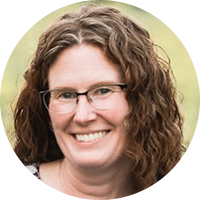 Kristine LeRoy received a B.S. in biochemistry from Iowa State University (ISU). While attending ISU, she worked for the USDA-ARS Corn Insect Research Unit, which cemented her interest in agronomic pests and control. She joined Corteva Agriscience in June 2009 as a member of the Ecotoxicology and Safety Assessment Laboratory in Regulatory Science. Her initial responsibilities ranged from bioassay development and study execution with pest species and non-target organisms, as well as overall lab duties. She is currently leading the Ecotoxicology and Safety Assessment Laboratory, a talented and diverse team focused on characterizing the environmental safety of genetically modified crops.
Kristine LeRoy received a B.S. in biochemistry from Iowa State University (ISU). While attending ISU, she worked for the USDA-ARS Corn Insect Research Unit, which cemented her interest in agronomic pests and control. She joined Corteva Agriscience in June 2009 as a member of the Ecotoxicology and Safety Assessment Laboratory in Regulatory Science. Her initial responsibilities ranged from bioassay development and study execution with pest species and non-target organisms, as well as overall lab duties. She is currently leading the Ecotoxicology and Safety Assessment Laboratory, a talented and diverse team focused on characterizing the environmental safety of genetically modified crops.
Mr. Alexander Mullins
Corteva Agriscience
 Alex Mullins serves as a Research Associate within the Farming Solutions & Digital team at Corteva Agriscience. In this role, Alex supports the planning and execution of small plot experiments, which provide insight for the integration of digital tools into the research and development of Corteva’s seed, crop protection and biological products. In a previous role, he was responsible for generating field data to conduct Tier IV Ecological Risk Assessment of biotechnologically derived insect control products for non-target arthropods in maize. Alex earned his M.S. in Ecology and Evolutionary Biology from Iowa State University, where his research focused on the oviposition and resource-seeking behavior of non-migrant Monarch butterflies to inform landscape-level conservation efforts. Alex earned his B.S. in Wildlife Biology from Adams State University and concurrently worked for the Bureau of Land Management, where he supported habitat management efforts for threatened and endangered species on public lands.
Alex Mullins serves as a Research Associate within the Farming Solutions & Digital team at Corteva Agriscience. In this role, Alex supports the planning and execution of small plot experiments, which provide insight for the integration of digital tools into the research and development of Corteva’s seed, crop protection and biological products. In a previous role, he was responsible for generating field data to conduct Tier IV Ecological Risk Assessment of biotechnologically derived insect control products for non-target arthropods in maize. Alex earned his M.S. in Ecology and Evolutionary Biology from Iowa State University, where his research focused on the oviposition and resource-seeking behavior of non-migrant Monarch butterflies to inform landscape-level conservation efforts. Alex earned his B.S. in Wildlife Biology from Adams State University and concurrently worked for the Bureau of Land Management, where he supported habitat management efforts for threatened and endangered species on public lands.
Dr. Andrew Roberts
Agriculture & Food Systems Institute
 Dr. Andrew Roberts joined the Agriculture & Food Systems Institute (AFSI) in December 2009 as the Deputy Director of the Center for Environmental Risk Assessment (CERA), where he developed tools and materials for use in training and capacity building related to the problem formulation approach to environmental risk assessment and served as the coordinator for CERA’s capacity building projects under the USAID-funded South Asia Biosafety Program (SABP) and the World Bank-funded Partnership for Biosafety Risk Assessment and Regulation, in Bangladesh, Pakistan, and Vietnam. He also provided technical support for capacity building work in Brazil, India, Japan, Chile, and South Africa. In January 2015, he became the director of CERA, as well as the Center for Safety Assessment of Food and Feed (CSAFF), which worked on food and feed safety assessment for foods derived from genetically engineered plants. The two centers were later consolidated under the Research Foundation, for which he became Deputy Executive Director in January 2017. When the organization became the Agriculture & Food Systems Institute in 2020, his title shifted to Vice President – Biotechnology, and he assumed the role of Chief Executive Officer later that year.
Dr. Andrew Roberts joined the Agriculture & Food Systems Institute (AFSI) in December 2009 as the Deputy Director of the Center for Environmental Risk Assessment (CERA), where he developed tools and materials for use in training and capacity building related to the problem formulation approach to environmental risk assessment and served as the coordinator for CERA’s capacity building projects under the USAID-funded South Asia Biosafety Program (SABP) and the World Bank-funded Partnership for Biosafety Risk Assessment and Regulation, in Bangladesh, Pakistan, and Vietnam. He also provided technical support for capacity building work in Brazil, India, Japan, Chile, and South Africa. In January 2015, he became the director of CERA, as well as the Center for Safety Assessment of Food and Feed (CSAFF), which worked on food and feed safety assessment for foods derived from genetically engineered plants. The two centers were later consolidated under the Research Foundation, for which he became Deputy Executive Director in January 2017. When the organization became the Agriculture & Food Systems Institute in 2020, his title shifted to Vice President – Biotechnology, and he assumed the role of Chief Executive Officer later that year.
Prior to joining AFSI, Dr. Roberts worked at the U.S. Department of Agriculture (USDA) in several different capacities, all related to the regulation of agricultural biotechnology. He began his career at USDA as an AAAS Risk Policy Fellow in the Office of Science of Biotechnology Regulatory Services (BRS), the group responsible for regulating genetically engineered plants at USDA’s Animal Plant Health Inspection Service. After spending a year in the New Technologies office of the Foreign Agricultural Service serving as the lead for USDA’s efforts related to the Cartagena Protocol on Biosafety, he returned to BRS to serve in the International Affairs branch where he remained until joining AFSI.
Dr. Jörg Romeis
Agroscope
 Jörg Romeis is the head of the Biosafety Group at Agroscope in Zurich, Switzerland. Agroscope is the Swiss center of excellence for agricultural research and is affiliated with the Federal Office for Agriculture. He has an M.Sc. in biology and has been trained as an applied entomologist with a focus on biological control and multi-trophic interactions. He has more than 20 years of experience in non-target risk assessment of transgenic crops and the design and execution of non-target laboratory studies in particular. Besides research projects to investigate non-target impacts of selected transgenic plants and insecticidal compounds, he has also been actively involved in developing testing protocols and guidelines for non-target risk assessment. In 2023, he became the president of the International Society for Biosafety Research (ISBR), which aims to promote scientifically sound research that supports biosafety assessment.
Jörg Romeis is the head of the Biosafety Group at Agroscope in Zurich, Switzerland. Agroscope is the Swiss center of excellence for agricultural research and is affiliated with the Federal Office for Agriculture. He has an M.Sc. in biology and has been trained as an applied entomologist with a focus on biological control and multi-trophic interactions. He has more than 20 years of experience in non-target risk assessment of transgenic crops and the design and execution of non-target laboratory studies in particular. Besides research projects to investigate non-target impacts of selected transgenic plants and insecticidal compounds, he has also been actively involved in developing testing protocols and guidelines for non-target risk assessment. In 2023, he became the president of the International Society for Biosafety Research (ISBR), which aims to promote scientifically sound research that supports biosafety assessment.
Dr. Tom Sappington
Corn Insects and Crop Genetics Research Unit, USDA–ARS and Department of Plant Pathology, Entomology & Microbiology, Iowa State University
 Tom Sappington is a Research Entomologist and Lead Scientist in the Corn Insects and Crop Genetics Research Unit, USDA–ARS, in Ames, Iowa and an Affiliate Professor in the Department of Plant Pathology, Entomology & Microbiology at Iowa State University. He received his Ph.D. in Systematics & Ecology from the University of Kansas in 1989, and his formal training is as an insect ecologist. In Ames, he mainly studies the ecology, behavior, management, and population genetics of European corn borer (Ostrinia nubilalis) and western corn rootworm (Diabrotica virgifera virgifera). Before transferring to Iowa in 2003, he served as Lead Scientist of the ARS cotton insects project in Weslaco, Texas, where he conducted research mainly on boll weevil (Anthonomus grandis). His current research focuses on insect movement as it affects agriculture, including in the context of insect resistance management. He conceived, co-organized, and led the international Diabrotica Genetics Consortium from 2003-2016 and served as the North American Co-convenor of IWGO (International Working Group on Ostrinia and other maize pests) from 2011-2023. He served as Subject Editor for Environmental Entomology for 16 years and has 150 peer-reviewed publications. He will retire in August 2024 after 45 years of entomological research.
Tom Sappington is a Research Entomologist and Lead Scientist in the Corn Insects and Crop Genetics Research Unit, USDA–ARS, in Ames, Iowa and an Affiliate Professor in the Department of Plant Pathology, Entomology & Microbiology at Iowa State University. He received his Ph.D. in Systematics & Ecology from the University of Kansas in 1989, and his formal training is as an insect ecologist. In Ames, he mainly studies the ecology, behavior, management, and population genetics of European corn borer (Ostrinia nubilalis) and western corn rootworm (Diabrotica virgifera virgifera). Before transferring to Iowa in 2003, he served as Lead Scientist of the ARS cotton insects project in Weslaco, Texas, where he conducted research mainly on boll weevil (Anthonomus grandis). His current research focuses on insect movement as it affects agriculture, including in the context of insect resistance management. He conceived, co-organized, and led the international Diabrotica Genetics Consortium from 2003-2016 and served as the North American Co-convenor of IWGO (International Working Group on Ostrinia and other maize pests) from 2011-2023. He served as Subject Editor for Environmental Entomology for 16 years and has 150 peer-reviewed publications. He will retire in August 2024 after 45 years of entomological research.
Ms. Layla Tarar
Agriculture & Food Systems Institute
 Layla creates, implements, and oversees AFSI’s communication and digital learning strategies and is continuously working to improve the distribution and impact of the institute’s scientific program outputs. Working closely with her colleagues, she develops and executes a cohesive outreach strategy using video, print, and online methods, including but not limited to the organization’s website, newsletter, and social media platform. She is also responsible for developing, managing, and advancing AFSI’s e-learning program, as well as working with scientific and operations staff to plan and conduct online trainings, workshops, and webinars.
Layla creates, implements, and oversees AFSI’s communication and digital learning strategies and is continuously working to improve the distribution and impact of the institute’s scientific program outputs. Working closely with her colleagues, she develops and executes a cohesive outreach strategy using video, print, and online methods, including but not limited to the organization’s website, newsletter, and social media platform. She is also responsible for developing, managing, and advancing AFSI’s e-learning program, as well as working with scientific and operations staff to plan and conduct online trainings, workshops, and webinars.
Layla joined the AFSI team in August 2017 as a Communications Associate. She was promoted to Communications Manager in September 2018 and was heavily involved in the organization’s renaming and rebranding. Her role was expanded to Manager of Communications & Digital Learning after the organization became the Agriculture & Food Systems Institute in 2020.
Prior to joining AFSI, Layla worked in Rome as Editor and Web Content Administrator at the School of European Political Economy, LUISS University. Before moving to Italy, she spent a year in Pakistan working as Community Liaison Office Coordinator at the U.S. Consulate in Karachi, which was preceded by two years in the United Arab Emirates, working as Management Assistant at the U.S. Embassy in Abu Dhabi. She has a B.A. in Biology and International Relations from Boston University and is fluent in English, Italian, and Thai.

